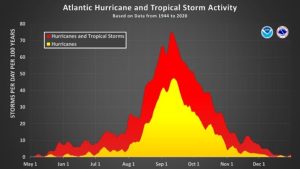 While June 1st does seem early, history has shown that some storms can show themselves early on any given year. By the time September comes around, people seem to be lulled to sleep. Having had the opportunity to speak at a Healthcare Risk Management conference with an associate from Zurich Insurance last September in Boston on weather risks and preparation, the question came up asking why the predictions are so high this year and we have not had any significant hurricanes. The immediate answer was… it is still early, and we are just hitting the peak season when historically most hurricanes hit. For example, almost two weeks to the day, Hurricane Ian hit the Florida coast in the Fort Myers area. For those in the path, it only takes one storm… and lives and businesses and their view of hurricanes can be changed forever.
While June 1st does seem early, history has shown that some storms can show themselves early on any given year. By the time September comes around, people seem to be lulled to sleep. Having had the opportunity to speak at a Healthcare Risk Management conference with an associate from Zurich Insurance last September in Boston on weather risks and preparation, the question came up asking why the predictions are so high this year and we have not had any significant hurricanes. The immediate answer was… it is still early, and we are just hitting the peak season when historically most hurricanes hit. For example, almost two weeks to the day, Hurricane Ian hit the Florida coast in the Fort Myers area. For those in the path, it only takes one storm… and lives and businesses and their view of hurricanes can be changed forever.
First-Hand Insights on Hurricane Preparedness
 One of our clients who we helped recover after Hurricane Ian shared some very insightful takeaways. In a recent conversation with Bob Boykin, President of Boykin Management Group, he shares some of the lessons learned from his own hurricane preparedness and recovery experience.
One of our clients who we helped recover after Hurricane Ian shared some very insightful takeaways. In a recent conversation with Bob Boykin, President of Boykin Management Group, he shares some of the lessons learned from his own hurricane preparedness and recovery experience.
Bob Boykin: I have said often if after the hurricane you need to organize your resources…you’re way late to the party! This needs to start every year in developing a cogent, workable plan. We learned many lessons from Hurricane Ian. I now ask the team wherever we can “How can we harden the site?” Don Lombardo with GRS shared with us the elevator barriers which is a good example of something we should have had. We do now.
Jim Wills: Are there any other observations you want to share?
Bob Boykin: Yes, speed matters- by being early on the recovery we were able to get things off the shelf before the shelves went bare. Backflow preventers, switch gear, electronic components of all kinds are examples of things that we procured when others did not. A competing high-rise hotel told me they were 40 weeks out waiting on elevator parts, wow that is painful.
As soon as you can, inventory all spaces and take lots of pictures. Think about a communication backup away from affected areas, having a place and people that can act as a traffic controller can make life much easier for staff.
While not easy, carrying a comfortable reserve made a big difference for us, we were able to make good decisions and not sweat the nickels.
Jim: If you could do it all again, what would you change?
Bob: Let’s write the recovery services contract in advance and negotiate away from an actual event.
In summary, Bob’s key recommendation is to do everything you can to help your organization be proactive versus reactive when it comes to hurricane preparedness. Look for vulnerabilities in your property that could be mitigated with flood barriers and other mitigation tools. Do what you can to harden your property and then get out of harm’s way.
Hurricanes are only one of the many interruptions that could impact a business. The time to plan is now, not when the storm is forecasted days away. As we know, hurricanes and storms can be unpredictable and hard to plan for at the last minute. Hurricane Ian took an unexpected turn away from its original forecast, avoiding Tampa, and ended up zeroing in on Fort Myers Beach, Sanibel, and Captiva. It only takes one to gain more knowledge than you had hoped for!

